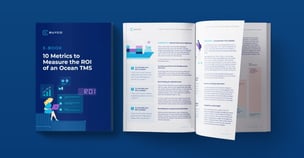In this ever-changing business landscape, building resilience is essential to address unexpected events that can have a significant financial impact on businesses. To navigate through uncertain times, it is crucial to utilize tools that offer your teams visibility into their operations. This enables them to proactively address disruptive supply chain incidents and make strategic decisions.
The pandemic and the Suez Canal blockage have shown us that maritime transportation can be highly unpredictable. As you would know, the six-day blockage in the canal held up goods worth $9.6 billion per day and trade worth $400 million an hour.
Experts note that ocean freight visibility is more complex and nuanced than over-the-road visibility due to the multiple factors involved – currents, wind speeds, trans-shipments, berthing time, container offloading time, and customs, among others. Locating freight in real-time is more important now than ever because, according to Sea Intelligence, 70% of the cargo has been arriving late in the past few months, and severe vessel delays have caused shippers to lose 5 to 10 billion USD thus far.
All these indicate that tracking the freight without a proper tool can be time- consuming, challenging, and costly. An Ocean TMS comes to your aid here by letting you:
Save time on checking freight location
The traditional approach of some transport managers on ocean visibility requires them to use carrier-dependent milestones to track ETAs. They need to rely on the carrier’s data or visit their website often to check the location and status of your containers. However, the real-time visibility of an Ocean
TMS automatically sends you updates on the ETA and latest location of your shipment and any hiccups or en-route delays.
To calculate your ROI, consider: “How much time/money could my organization save by not having to manually check or track containers or ETA?”
Gain predictive visibility insights
An Ocean TMS offers predictive visibility into the ETA reliability of a vessel before booking, thus helping you preempt exceptions. For instance, if the ETA reliability of a vessel on a given line is 70%, there is a 30% chance that the shipment will arrive late. Equipped with such insights, you can prepare your
customer for any probable delays or select another vessel with a higher ETA reliability on that given line. It also helps avoid costs associated with last-minute air shipments.
To calculate your ROI, consider: “How much money could I save with predictive visibility and avoiding exceptions before they occur?
React faster to exceptions
Delayed shipments can cost shippers a lot – they will need to re-coordinate everything, which takes time, money, and effort. Shippers who transport perishable goods incur more financial losses due to unforeseen delays. Since an Ocean TMS integrates with shipping lines and other geo localization sources, you get notifications as soon as exceptions arise. It allows you
to react to exceptions fast and prevent financial loss.
To calculate your ROI, consider: “How much money could I save by reacting faster to exceptions?
To gain in-depth insight about other crucial metrics that influence the implementation of an Ocean TMS, discover our latest e-book :

